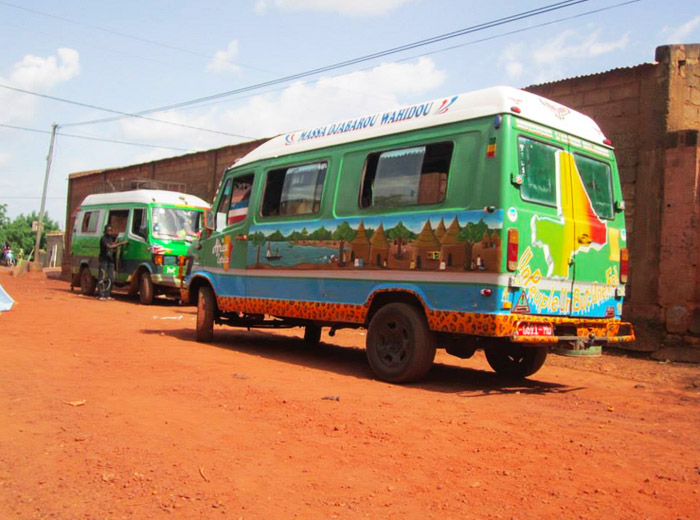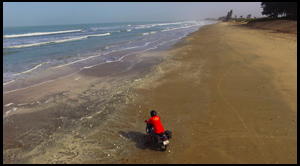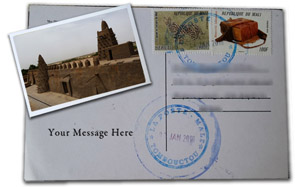SOTRAMA in Koulikoro. They don’t come more patriotic than this one.
Well, it’s going to happen. Despite the fact that many analysts, diplomats and even members of Mali’s own electoral body have expressed doubts over the timing, there it sits on the calendar. July 28th. Six days away.
Mali needs a legitimate government. No one will argue with that. But quick and dirty elections have the potential to lead to another crisis. Mali has historically dealt with low voter turnout (it has never passed 40%) and organizational problems on election day (significant numbers of votes have been thrown out in previous elections). But this year’s presidential election will present more simultaneous variables than in any of the previous four:
- The election date falls during the rainy season and Ramadan (when large numbers of people are in the fields and/or fasting during the day).
- Insecurity reigns in the northern region of Kidal, despite the presence of UN and French forces.
- There are still large numbers of refugees in neighboring countries and while UNHCR is supposedly facilitating their participation in the election, it could be a complete mess.
- Of all times to do it, Mali introduced a new biometric voter ID card before this election, which has presented its own set of logistical problems (I could write a whole post on the NINA card saga as it has played heavily in our activities at SOS Democracy)
But the election is going to happen. So how will it turn out? I have a few thoughts. Don’t take them too seriously as there are many other people who have more insight than I do (I will provide some links at the end of this post).
Voter turnout could be higher than it has been in any previous election
It may seem counterintuitive to project high voter turnout after listing the reasons why the election could be a disaster, so let me explain. I think that a large percentage – relatively large, over 40% would already be record breaking – of eligible voters plan on voting in this election (there is some supporting data here from Sidiki Guindo, who as Bruce Whitehouse notes, is the only independent pollster in Mali). Whether they are unable to vote because of poor organization, logistics, or security is another issue. If the voter participation rate eclipses 40% in this election, we know that it likely could have been higher given more favorable circumstances. In other words, the numbers might not reflect the whole story.
Why the higher turnout? I would love to say that SOS Democracy has something to do with it, and while I do believe the group has had a small impact in its own way, there is a bigger reason for increased voter turnout: the coup. During this extended break from democracy, the public topic of conversation has centered on 20 years of poor governance. The coup hit the reset button and there is the feeling, however fleeting it could possibly be, that things can change.
The participation of party activists was never in doubt. And political parties will do their best to essentially buy votes (RPM, URD, and ADEMA all have boatloads of cash). But conditions are right for a number of new voters to participate, voters that might not necessarily be in a party’s pocket. Over the past several months, I’ve met many people at SOS events who told me they would be voting for the first time, despite being eligible to vote in at least one previous election.
And candidates seem to be changing – to an extent – their approach to the campaign. Many have released a program detailing their plans for their country (although, it seems the frontrunner, Ibrahim Boubacar Keita aka IBK, still has not done so) and at least one (Moussa Mara) has publicly disclosed his financial assets. Many candidates have also engaged in an aggressive ground campaign.
In the end, my judgment could be clouded by the fact that I’ve been spending time around a group of motivated Malian activists. We shall see. In any case, we will never know what the voter turnout could have been, provided more favorable voting circumstances.
Best-case scenario that is also realistic
Disclaimer: I do not support one candidate or another. Keep in mind that these comments come from a random tubab who has spent a relatively small amount of time in Mali, and they concern what I think is an outcome that is both realistic and favorable for Mali. There are many other possibilities.
Here goes: IBK, the current frontrunner, wins. But not only that, he wins in the first round and the voter participation rate is above 50%. There are a few organizational issues here and there, but otherwise voting goes smoothly. A few people cast their ballots in Kidal and 0 voting bureaus are burned to the ground. MUJAO stays home, wherever that is, and the MNLA lay low as well. Oh, and the UNHCR somehow facilitates a high level of refugee participation.
I am generally skeptical of all politicians and it should be said that there is not a candidate in this race that is going to single handedly change Mali’s political culture. This is an important election, yes, but transforming Mali’s institutions and cultivating more transparent governance will not happen overnight. All of the frontrunners have political baggage and they will be beholden to a variety of interests (if you tell me Dramane Dembele doesn’t have baggage, I will just say: ADEMA.). Some Malians will say that IBK has less baggage (at least in terms of corruption) than other candidates like Modibo Sidibe and Soumaila Cisse, but I’m not going to get into that here.
IBK has a high likelihood of winning the election. He has broad support, including support from influential Muslim leaders and a large number of political parties and associations, and while he is one of the old dinosaurs, he is not as closely associated with ATT and co – 2nd term ATT in particular – as some of the other candidates. If he does win, it would be in Mali’s best interest if he won by a large margin in an election that was not marred by organizational problems, allegations of fraud etc. But, like I said, there are other possibilities.
Worst-case scenario that is hopefully not realistic
The first round does not produce a winner and URD’s Soumaila Cisse advances to the second round with IBK. Voting is disorganized and there are problems country-wide in both rounds. MUJAO tries to blow something up and/or the MNLA holds a polling center hostage. Soumaila wins the 2nd round by a small and controversial margin. Sanogo and co, who arrested and detained Soumaila after the coup, intervene and reassert control over the government. The rainy season comes to an abrupt halt. Crops die. Ok, I’ll stop.
I don’t think this will happen, and anyway, I don’t want to dwell on the possibility. In fact, let me just take a moment to wish Mali peaceful, fair, and transparent elections that produce a President who is widely considered to be credible and legitimate.
News from SOS Democracy
I am in Abidjan now, but I have been keeping up with the group from here and there have been many developments over the past couple of weeks. We fell flat on our crowdfunding campaign, but we have been able to partner with several large and small organizations that saw the merit in what the group was doing. We partnered with JokkoLabs, a co-working space in Bamako led by a group of tech activists (JokkoLabs is also in Dakar and Ouaga), to set up info hotlines and the Ushahidi crowdmapping platform to track campaign and election incidents. See that site at Mali2013.net.
To read more about the hotlines and how they were set up, please read this post. USAID is providing us with phone credit so that we can call back everyone that beeps the number and they are also helping us purchase advertising on TV and radio. As of now, the hotline has fielded almost 2000 calls (see the data here. Check out other projects in JokkoLab’s newly launched Open Data Mali project while you’re at it).
The film that we were working on with Yeredon and Tirera Films is done. Legendary Malian actor Isiaka Kane aka Siakaba is featured in the film (he also scripted it and helped with the direction) along with a number of young and highly talented actors from Yeredon. Kalilou Tirera and his film crew were a pleasure to work with and it was great to see Kalilou and Siaka collaborate – both of them care deeply about their craft. The film is in Bamanankan, but we are working on translations into other local languages and eventually French.
A brief synopsis: Sali and Dejenbou attend several political party gatherings, where they receive things like tshirts, aprons, hats etc. When they cross paths with some of the village youth, including Sali’s son, Djibi, they are mocked. They explain that they can take gifts from political parties but it doesn’t mean they are obliged to vote for them. They then tell Djibi and his friends that they need to get their NINA cards to vote. They mock the two women once more and each one explains how things work in Mali. For example, one explains that he paid money to graduate, another says that he will play football, but not in Mali, in Spain. Each one reveals an aspect of a flawed system and the women then explain that nothing will change if they don’t participate in the country’s democracy.
Later, Sali’s husband Coulibaly, played by Siakaba, is angry about the fact that his wife is participating in politics and that she is spending all day trying to get people to retrieve their NINA cards, etc. Sali and Djenebou run from the house and approach the dugutigi, the village chief, who calls a meeting with Coulibaly. The dugutigi and Djenebou are able to convince Coulibaly that Sali is doing important work and Coulibaly becomes a pro-democracy activist himself. The movie ends on a high note with everyone voting.
Everyone participated in this film on a volunteer basis and both Kalilou’s crew and Yeredon put in long hours to see it finished. Enormous props to them.
Links
As always, I recommend Bruce Whitehouse for your anglophone Mali analysis.
I would also recommend this brief from Tobias Koepf and Cristina Barrios.
**Update: I would also recommend this guest post on Sahel Blog from Dr. Leonardo A. Villalon.
I will hopefully add some more links here in the coming days.
Personal
I am in Abidjan now, but do plan on making a trip back to Mali for the elections. I am still trying to figure out how I will make this happen.





Nice work, Phil – under your worst-case scenario, I think one could substitute the name “Modibo Sidibé” for “Soumaila Cissé” and get an equally dangerous outcome. If you were to ask Bamakois which candidate they detest most, I suspect Modibo would come out on top: he was ATT’s prime minister while a lot of bad things were happening, and rightly or wrongly is believed to have been associated with the corruption and incompetence that characterized Malian politics for the last several years. Like Cissé, Modibo was also detained by the junta last year. I’m afraid a Modibo win could generate widespread suspicion and protest. (I like to think it won’t happen because I’ve never met a Malian who likes the man, but one never knows!)
Hey Bruce,
Thanks for adding to this. I think you are right about Modibo in terms of what the reaction would be. At the same time I think a Modibo win is a real longshot. A Soumaila win seems more realistic to me. But you’re right, one never knows…
Despite Modibo’s “high negatives,” I suspect his campaign is quite well funded, which can certainly make a difference.
won’t argue with you there
Thanks for sharing this video on your site – watched every minute of it, and your synopsis made it easy to understand. I loved everything about it – the entertaining presentation and the message. Memorable song.
Suggestion: I’d have inserted your excellent synopsis into the youtube comment section, but I didn’t want to do so without your permission – this would really help English speakers who watch the video. … because this video isn’t just about what’s going on in Mali; it has application other places, as well. Would you consider adding your synopsis?
Hey Mzuri,
Glad to hear that!! That’s a great idea. I had sent it to Tirera to add to the description as he uploaded it with his Tirera Films account. In the meantime, I will add it to the comments. Thanks!!
Thanks for the update and insight brother. We’ve been trying to keep an eye on the election buzz over here (the best we can). FIngers crossed for successful, safe, and secure elections!! Haven’t watched the video but I’ll check it tonight!
Much love,
Benjamin